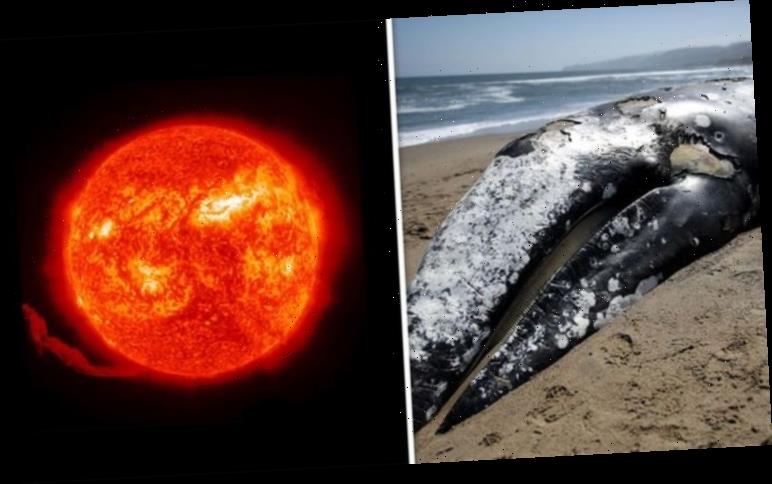Experts have been trying to determine why grey whales beach themselves for no apparent reason, IE without having been injured, or ill, or confused by Navy sonar blasts. Scientists believe that whales have an internal compass, which helps them navigate the globe by using magnetic fields in the same way that birds do.
During solar storms, these magnetic field lines can shift, which could confuse the whales’ compass. However, a new study has found that this is not what is confusing whales.
Lead author Jesse Granger, a PhD student in Biology at Duke University, said: “We were really surprised by our results.
“Geomagnetic storms are not stranding the whales.”
Instead, the experts argue, it is solar radio bursts which also come with solar storms that are confusing the whales.
During high activity on the Sun, it can emit broadband bursts of radio energy.
Radio operators report hearing a roar of static during a strong solar flare, and it would seem that this is what is confusing the whales, according to the study published in the journal Current Biology.
The team studied 35 years of grey whale stranding data compiled by NOAA to reach their conclusions.
They wrote: “We chose grey whales because their species has one of the longest migrations of any mammal and is a near-shore migrator — suggesting that small navigational errors increase the risk of stranding.
“Only whales that likely stranded alive with no signs of injury, illness, emaciation, or human interaction (e.g. Navy sonar, entanglement, or boat strikes) were used.”
According to the research, grey whales are 4.3 times more likely to strand themselves during a high solar radio bursts, and the experts state the study could be life saving.
They wrote: “Stranded whales rarely survive–only if they are found in time by groups that have the resources to re-float them.
“Using this correlation we may be able to make better predictions about when whales are at a higher risk of live stranding, and have the stranding networks be more active during those time periods.”
Solar storms can be detrimental to satellite-based technology as they can heat the Earth’s outer atmosphere, causing it to expand and making it more difficult for satellite signals to reach the ground.
This can affect satellites in orbit, potentially leading to a lack of GPS navigation, mobile phone signal and satellite TV such as Sky.
Additionally, a surge of particles can lead to high currents in the magnetosphere, which can lead to higher than normal electricity in power lines, resulting in electrical transformers and power stations blow outs and a loss of power.
Source: Read Full Article




